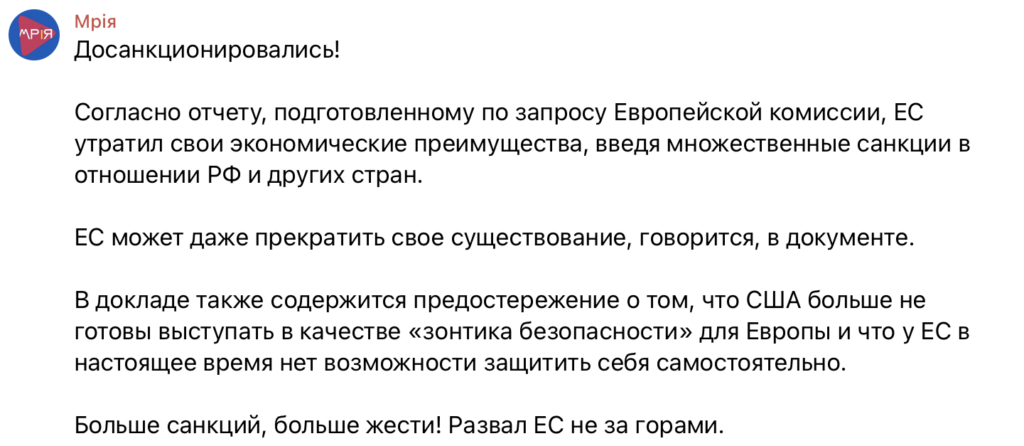Verification within Meta’s Third-Party Fact-Checking Program
Information is being circulated online claiming that the EU has lost its economic advantages and may cease to exist. This is allegedly stated in a report prepared at the request of the European Commission. The report also purportedly warns that the US is no longer ready to act as Europe’s “security umbrella” and that the EU is currently incapable of defending itself independently. It is further claimed that sanctions against Russia are the cause of economic decline.
However, this is false. In Mario Draghi’s report on the competitiveness of the EU economy, there are no statements suggesting that the EU will soon cease to exist, nor does he write that sanctions are the cause of economic difficulties.
Screenshot of the post
The posts do not specify which report for the European Commission allegedly predicts the collapse of the EU. However, it can be inferred that the reference is to the report by the former head of the European Central Bank, Mario Draghi, “The Future of European Competitiveness,” which consists of two documents: the abridged version, “A Competitiveness Strategy for Europe,” and the full report, “In-Depth Analysis and Recommendations.” This report was presented on September 9, 2024, and propagandists’ posts began appearing the next day, September 10.
In his report, Draghi outlines the challenges facing the EU amid growing geopolitical competition. The economist notes that the era of rapid global trade growth is over, and European companies now face increased competition and more restricted access to foreign markets. He does mention that Europe has lost its largest energy supplier — Russia — and emphasizes that dependency on it has turned into a vulnerability. However, he does not write that the EU lost its economic advantages as a result of imposing sanctions. On the contrary, he stresses the need to reduce dependence on energy supplies from other countries, including Russia.
Moreover, the loss of an energy supplier is far from the only reason for the EU’s reduced competitiveness. One of the key issues highlighted is the lack of investment in innovation. Draghi mentions that currently only 4 of the 50 largest technology companies in the world are European. The report states that the EU risks falling behind the economies of China and the US. He calls these challenges existential: “For the first time since the Cold War, we must genuinely fear for our self-preservation, and the reasons for a unified response have never been more compelling” Draghi said during the report’s presentation.
This report was intended to address how to maintain the competitiveness of the European economy and stimulate investment in the EU. According to the analysis, the EU needs to invest up to €800 billion in its own development. Draghi proposes raising these funds through pan-European borrowing on financial markets. His action plan includes many proposals — from decarbonizing the economy to strengthening the defense industry, which has been underfunded due to Europe’s long reliance on the US’s “security umbrella.”
The report does not state that the EU will soon cease to exist. However, it does warn that if the EU fails to address these economic challenges, it may lose its raison d’être. “Europe’s fundamental values are prosperity, equity, freedom, peace and democracy in a sustainable environment. The EU exists to ensure that Europeans can always benefit from these fundamental rights. If Europe can no longer provide them to its people – or has to trade off one against the other – it will have lost its reason for being,” the report says.
The claim that Western sanctions are ineffective and only harm the citizens of the countries implementing them is a narrative of Russian propaganda. By spreading such claims, Russians aim to achieve the lifting of sanctions.
Attention
The authors do not work for, consult to, own shares in or receive funding from any company or organization that would benefit from this article, and have no relevant affiliations

